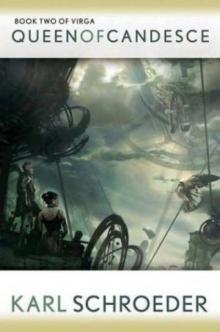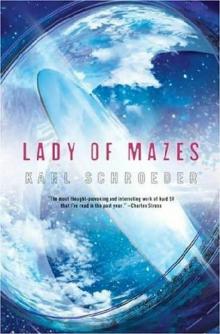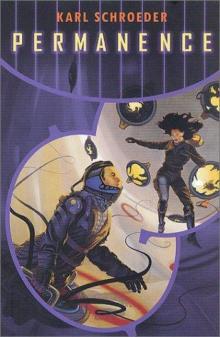- Home
- Karl Schroeder
Queen of Candesce v-2
Queen of Candesce v-2 Read online
Queen of Candesce
( Virga - 2 )
Karl Schroeder
Venera Fanning was last seen falling into nothingness at the end of Sun of Suns. Now, in Queen of Candesce, Venera finds herself plunging through the air among the artificial worlds of Virga, far from home and her husband, who may or may not be alive. Landing in the ancient nation of Spyre, Venera encounters new enemies and new friends (or at least convenient allies). She must quickly learn who she can trust, and who she can manipulate in order to survive. Survival isn't her only goal; with the powerful Key of Candesce in her hands, she can control the fate of the entire world of Virga, yet something even more pressing is driving her—the all consuming need for revenge.
QUEEN OF CANDESCE
Virga 02
Karl Schroeder
This is the serialisation of the forthcoming novel as printed in four parts in Analog Science Fiction and Fact 2007
Being literally thrown into an unfamiliar environment forces a person to adapt—and familiar ways of doing that may not be enough.
Prologue
Garth Diamandis looked up, and saw a woman in the sky.
The balcony swayed under him; distant trees wavered in the hot afternoon air though there was no breeze. A twist of little clouds pirouetted far overhead, just beneath the glitter and darkness of the city that had exiled Gareth to this place so many years ago. Well below the city, only a thousand feet up at this point, a single human form had appeared out of the light.
She rotated up out of Garth's view and he had to wait several minutes for her to come back around. Then, there she was: gliding with supernatural grace over the tall, ragged wall that rimmed the world at its nearer end. Behind her, infinite air beckoned, forever out of reach of Garth and the others like him. Ahead of the silent woman, a likely tumble into quickly moving trees, broken limbs and death. If she wasn't dead already.
Someone tried to escape, he thought—an act that always ended in gunshots or bloody thrashing beneath a swarm of piranhawks. This one must have been shot cleanly by the day watch for she was spiraling across the sky alone, not attended by a retinue of blood droplets. And now the spin-gale was teasing the fringes of her outlandish garment, slowing her; bringing her down.
Garth frowned, for a moment forgetting the aches and pains that bedeviled him all day and all night. The hovering woman's clothes had been too bright and fluttered too easily to be made of the traditional leather and metal of Spyre.
As the world turned the woman receded into the distance, frustrating Garth's attempt to see more. The ground under his perch was rotating up and away along with the whole cylindrical world; the black-haired woman was not moving with it but rather sailing in majestically from one of the world's open ends. But Spyre made its own winds as it turned, and those winds would pull her to its surface before she had a chance to drift out the other side.
She would have sped up by that time, but not enough to match Spyre's rotation. Garth well knew what happened when someone began clipping the treetops and towers at several hundred miles per hour. He'd be finding pieces of her for weeks.
The ground undulated again. Frantic horns began echoing in the distance—an urgent conversation between the inner surface of Spyre and the city above.
Watching the woman had been an idle pastime, since it looked as though she was going to come down along the rail line. People with more firepower and muscle than Garth owned that; they would see her in a few moments and bring her down. Her valuable possessions and clothes would not be his.
But the horns were insistent. Something was wrong with the very fabric of Spyre, an oscillation building. He could see it in the far distance now: the land heaved minutely up and down. The slow ripple was making its way in his direction; he'd better get off this parapet.
The archway opening onto the balcony had empty air behind it and a twenty-foot drop to tumbled stones. Garth hopped over the rail without hesitation, counting as he fell. “One pilot, two pilot, three—” He landed among upthrusts of stabbing weed and the cloud-like brambles that had taken over this ancient mansion. Three seconds? Well, gravity hadn't changed, at least not noticeably.
His muscles creaked as he stood up, but climbing and jumping were part of his daily constitutional, a grim routine aimed at convincing himself he was still a man.
He stalked over the crackling grit that painted a tiled dance floor. Railway ties were laid callously across the fine pallasite stones; the line cleaved the former Nation of Arbath like a whip-mark. Garth stepped onto the track daringly and stared down it. The great family of Arbath had not reached an accommodation with the preservationists and had been displaced or killed, he couldn't remember which. Rubble, ruins, and new walls sided the tracks; at one spot an abandoned sniper tower loomed above the strip. It swayed now uneasily.
The tracks converged in perspective but also rose with the land itself, a long graceful curve that became vertical if he followed it far enough. He didn't look that far, but focused on a scramble of activity taking place about a mile distant.
The Preservation Society had planted one of their oil-soaked sidings there like an obscene graffito. Some of the preservationists were pouring alcohol into the tanks of a big turbine engine that squatted on the tracks like an idol to industrialism. Others had started a tug and were shunting in cars loaded with iron plating and rubble. They were responding to the codes brayed out by the distant horns.
They were so busy doing all this that none had noticed what was happening overhead.
"You're crazy, Garth.” He hopped from foot to foot, twisting his hands together. When he was younger he wouldn't have hesitated. There was a time when he'd lived for escapades like this. Cursing his own cowardice, Garth lurched into a half run down the tracks—in the direction of the preservationist camp.
He had to prove himself more and more often these days. Garth still sported the black cap and long sideburns that rakes had worn in his day, but he was acutely aware that the day had come and gone. His long leather coat was brindled with cracks and dappled with stains. Though he still wore the twin holsters that had once held the most expensive and stylish dueling pistols available in Spyre, nowadays he just carried odd objects in them. His breath ratcheted in his chest and if his head didn't hurt, his legs did, or his hands. Pain followed him everywhere; it had made crow's-feet where once he'd outlined his eyes in black to show the ladies his long lashes.
The preservationist's engine started up. It was coming his way so Garth prudently left the track and hunkered down beneath some bushes to let it pass. He was in disputed land, so no one would accost him here, but he might be casually shot from a window of the train and no one would care. While he waited he watched the dot of the slowly falling woman, trying to verify his initial guess at her trajectory.
Garth made it the rest of the way to the preservationist camp without attracting attention. Pandemonium still reigned inside the camp, with shaven-headed men in stiff leather coats crawling like ants over a second, rust-softened engine, under the curses of a supervisor. The first train was miles up the curve of the world now, and if Garth bothered to look down the length of Spyre, he was sure he would see many other trains on the move as well. But that wasn't his interest.
Pieces of the world fell off all the time. It wasn't his problem.
He crept between two teetering stacks of railway ties until he was next to a pile of catch-nets the preservationists had dumped here. Using a stick he'd picked up along the way, he snagged one of the nets and dragged it into the shadows. Under full gravity it would have weighed several hundred pounds; as it was, he staggered under the weight as he carried it to a nearby line of trees.
She was going by again, lower now and fast in her lon
g spiral. The woman's clothes were tearing in the headwind, and her dark hair bannered behind her. When Garth saw that her exposed skin was bright red he stopped in surprise, then redoubled his efforts to reach the nearest vertical cable.
The interior of Spyre was spoked by thousands of these cables; some rose at low angles to reattach themselves to the skin of the world just a few miles away. Some shot straight up to touch down on the opposite side of the cylinder. All were under tremendous tension and every now and then one snapped; then the world ran like a bell for an hour or two and shifted, and more pieces fell off of it.
Aside from keeping the world together, the cables served numerous purposes. Some carried elevators. The one Garth approached had smaller lines draped and coiled around its frayed black surface—some old, rusted, and disused pulley system. The main cable was anchored to a corroded metal cone that jutted out of the earth. He clipped two corners of the roll of netting to the old pulley. Then he jogged away from the tracks, unreeling the net behind him.
It took far too long to connect a third corner of the huge net to a corroded flagpole. Sweating and suffering palpitations, he ran back to the flagpole one more time. As he did she came by again.
She was a bullet. In fact, it was the land that was speeding by below her and pulling the air with it. If she'd been alive earlier she might be dead now; he doubted whether anyone could breathe in such a gale.
As soon as she shot past, Garth began hauling on the pulleys. The net lurched into the air a foot at a time. Too slow! He cursed and redoubled his effort, expecting to hear shouts from the preservationist camp at any moment.
With agonizing slowness, a triangle of netting rose. One end was anchored to the flagpole; two more were on their way up the cable. Had he judged her trajectory right? It didn't matter; this was the only attachment point for hundreds of yards, and by now she was too low. Air resistance was yanking her down, and in moments she would be tumbled to pieces on the ground.
Here she came. Garth wiped sweat out of his eyes and pulled with bloody hands. At that moment the shriek of a steam whistle sounded from the preservationist camp. The rusted engine was on the move.
The mysterious woman arrowed in just above the highest trees. Garth thought for sure she was going to miss his net. Then, just as the rusted engine sailed by on the tracks—he caught snapshot glimpses of surprised preservationist faces and open mouths—she hit the net and yanked it off the cable.
A twirling screw hit Garth in the nose and he sat down. Sparks shot from screaming brakes on the tracks, and the black tangling form of the falling woman passed between the Y-uprights of a jagged tree, the trailing net catching branches and snapping them as she bounced with astonishing gentleness into a bed of weeds.
Garth was there in seconds, cutting through the netting with his knife. Her clothes marked her as a foreigner, so her ransom potential might be low. He probably couldn't even get much for her clothes; cloth like that had no business being worn in Spyre. Oh well; maybe she had some adornments that might fetch enough to buy him food for a few weeks.
Just in case, he put a hand on her neck—and felt a pulse. Garth cursed in astonishment. Jubilantly he slashed away the rest of the strands and pulled her out as a warning shot cracked through the air.
Unable to resist, he teased back the wave of black hair that fell across her face. The woman was fairly young—in her twenties—and had fine, sharp features with well-defined black eyebrows and full lips. The symmetry of her face was broken only by a star-shaped scar on her jaw. Her skin would have been quite fair were it not deeply sunburnt.
She only weighed twenty pounds or so. It was easy to sling her over his shoulder and run for the deep bush that marked the boundary of the disputed lands.
He pushed his way through the branches and onto private land. The preservationists pulled up short, cursing, just shy of the bushes. Garth Diamandis laughed as he ran; and for a precious few minutes, he felt like he was twenty years old again.
1
A low-beamed ceiling swam into focus. Venera Fanning frowned at it, then winced as pain shot through her jaw. She was definitely alive, she decided ruefully.
She was—but was Chaison Fanning also among the living, or was Venera now a widow? That was it, she had been trying to get back to her husband, Chaison Fanning. Trying to get home—
Sitting up proved impossible. The slightest motion sent waves of pain through her; she felt like she'd been skinned. She moaned involuntarily.
"You're awake?” The thickly accented words had the crackle of age to them. She turned her head gingerly and made out a dim form moving to sit next to her. She was lying on a bed—probably—and he was on a stool or something. She blinked, trying to take in more of the long, low room.
"Don't try to move,” said the old man. “You've got severe sunburn and sunstroke, too. Plus a few cuts and bruises. I've been wetting down the sheets to give you some relief. Gave you water, too. Don't know what else to do."
"Th-thanks.” Then she looked down at herself. “Where are my clothes?"
His face cracked in a smile, and for a second he looked much younger. He had slab-like features, with prominent cheekbones and piercing gray eyes. Eyes like that could send chills through you, and from his confident grin he seemed to know it. But as he shifted in the firelight, she saw that lines of care and disappointment had cut away much of his handsomeness.
"Your clothes are here,” he said, patting a chair or table nearby. “Don't worry, I've done nothing to you—not out of virtue, mind, I'm not a big fan of virtue, mine or anyone else's. No, you can thank arthritis, old wounds, and age for your safety.” He grinned again. “I'm Garth Diamandis. And you are a foreigner."
Venera sighed listlessly. “Probably. What does that mean around here?"
Diamandis leaned back, crossing his arms. “Much, or nothing, depending."
"And here is…?"
"Spyre,” he said.
"Spyre…” She thought she should remember that name. But Venera was already falling asleep. She let herself do it; after all, it was so cool here…
When she awoke again it was to find herself propped half upright in a chair. Her forehead, upper body, and arms were draped with moist sheets. Blankets swaddled her below that.
Venera was facing a leaded-glass window. Outside, green foliage made a sunlit screen. She heard birds. That suggested the kind of garden you only got in the bigger towns—a gravity-bound garden where trees grew short and squat, and soil stayed in one place. Such things were rare—and that, in turn, implied wealth.
But this room… As she turned her head her hopes faded. This was a hovel, for all that it too seemed built for gravity. The floor was the relentless iron of a town foundation, though surprisingly she could feel no vibration from engines or slipstream vanes through her feet. The silence was uncanny, in fact. The chamber itself was oddly cantilevered, as though hollowed out of the foundations of some much larger structure. Boxes, chests, and empty birdcages were jammed or piled everywhere, a few narrow paths worn between them. The only clear area was the spot where her overstuffed armchair sat. She located the bed to her left, some tables, and a fireplace that looked like it had been clumsily dug into the wall by the window. There were several tables here and the clutter had infected them as well; they were covered with framed pictures.
Venera leaned forward, catching up the sheet at her throat. A sizzle of pain went through her arms and shoulders, and she extended her left arm, snarling. She was sunburned a deep brick red, which was already starting to peel. How long had she been here?
The pictures. Gingerly, she reached out to turn one in the light. It was of a young lady holding a pair of collapsible wrist-fins. She wore a strange, stiff-looking black bodice, and her backdrop was indistinct but might have been clouds.
All the portraits were of women, some two dozen by her estimation. Some were young, some older; all the ladies seemed well-off from their various elaborate hairdos. Their clothes were outlandish, though,
made of sweeping chrome and leather, clearly heavy and doubtless uncomfortable. There was, she realized, a complete absence of cloth in these photos.
"Ah, you're awake!” Diamandis shuffled his way through the towering stacks of junk. He was holding a limp bird by the neck; now he waved it cheerfully. “Lunch!"
"I demand to know where I am.” She started to stand and found herself propelled nearly to the ceiling. Gravity was very low here. Recovering with a wince, she coiled the damp sheet around her for modesty. It didn't help; Diamandis frankly admired her form anyway, and probably would have stared even if she'd been sheathed in plate armor. It seemed to be his way, and there was, strangely, nothing offensive about it.
"You are a guest of the Principality of Spyre,” said Diamandis. He sat down at a low table and began plucking the bird. “But I regret to have to inform you that you've landed on the wrong part of our illustrious nation. This is Greater Spyre, where I've lived now for, oh… twenty-odd years."
She held up the picture she had been looking at. “You were a busy man, I see."
He looked over and laughed in delight. “Very! And why not? The world is full of wonders, and I wanted to meet them all."
Venera touched the stone wall and now felt a faint thrum, but very slight. “You say this is a town? An old one… and you've turned gravity way down.” Then she turned to look at Diamandis. “What did you mean, ‘regret to inform me'? What's wrong with this Greater Spyre?"
He looked over at her, and now he seemed very old. “Come. If you can walk, I'll show you your new home."
Venera bit back a sharp retort. Instead, she sullenly followed him through the stacks. “My temporary residence, you mean,” she said to the cracked leather back of his coat. “I am making my way back to the court at Slipstream. If ransom is required, you will be paid handsomely for my safe return…” He laughed, somewhat sadly.

 Ventus
Ventus Sun of Suns v-1
Sun of Suns v-1 Ashes of Candesce: Book Five of Virga
Ashes of Candesce: Book Five of Virga Queen of Candesce v-2
Queen of Candesce v-2 Lady of Mazes
Lady of Mazes Permanence
Permanence